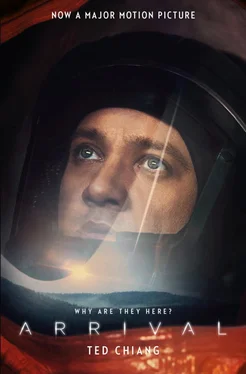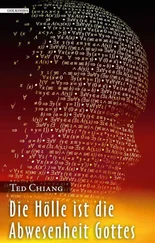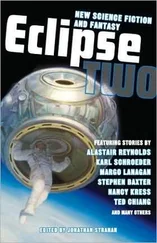‘You find the prospect troubling,’ said Fieldhurst. ‘That is to be expected: Dr. Ashbourne and myself initially felt the same way, as has everyone who has considered this. No one relishes the prospect of humans being conceived artificially. But can you offer an alternative?’ Stratton was silent, and Fieldhurst went on. ‘All who are aware of both Dr. Ashbourne’s and Dubuisson and Gille’s work agree: there is no other solution.’
Stratton reminded himself to maintain the dispassionate attitude of a scientist. ‘Precisely how do you envision this name being used?’ he asked.
Ashbourne answered. ‘When a husband is unable to impregnate his wife, they will seek the services of a physician. The physician will collect the woman’s menses, separate out the ovum, impress the name upon it, and then reintroduce it into her womb.’
‘A child born of this method would have no biological father.’
‘True, but the father’s biological contribution is of minimal importance here. The mother will think of her husband as the child’s father, so her imagination will impart a combination of her own and her husband’s appearance and character to the foetus. That will not change. And I hardly need mention that name impression would not be made available to unmarried women.’
‘Are you confident this will result in well-formed children?’ asked Stratton. ‘I’m sure you know to what I refer.’ They all knew of the disastrous attempt in the previous century to create improved children by mesmerizing women during their pregnancies.
Ashbourne nodded. ‘We are fortunate in that the ovum is very specific in what it will accept. The set of euonyms for any species of organism is very small; if the lexical order of the impressed name does not closely match the structural order of that species, the resulting foetus does not quicken. This does not remove the need for the mother to maintain a tranquil mind during her pregnancy; name impression cannot guard against maternal agitation. But the ovum’s selectivity provides us assurance that any foetus induced will be well formed in every aspect, except the one anticipated.’
Stratton was alarmed. ‘What aspect is that?’
‘Can you not guess? The only incapacity of frogs created by name impression was in the males; they were sterile, for their spermatozoa bore no preformed foetuses inside. By comparison, the female frogs created were fertile: their eggs could be fertilized in either the conventional manner, or by repeating the impression with the name.’
Stratton’s relief was considerable. ‘So the male variant of the name was imperfect. Presumably there needs to be further differences between the male and female variants than simply the sexual epithet.’
‘Only if one considers the male variant imperfect,’ said Ashbourne, ‘which I do not. Consider: while a fertile male and a fertile female might seem equivalent, they differ radically in the degree of complexity exemplified. A female with viable ova remains a single organism, while a male with viable spermatozoa is actually many organisms: a father and all his potential children. In this light, the two variants of the name are well matched in their actions: each induces a single organism, but only in the female sex can a single organism be fertile.’
‘I see what you mean.’ Stratton realized he would need practice in thinking about nomenclature in the organic domain. ‘Have you developed euonyms for other species?’
‘Just over a score, of various types; our progress has been rapid. We have only just begun work on a name for the human species, and it has proved far more difficult than our previous names.’
‘How many nomenclators are engaged in this endeavor?’
‘Only a handful,’ Fieldhurst replied. ‘We have asked a few Royal Society members, and the Académie has some of France’s leading designateurs working on it. You will understand if I do not mention any names at this point, but be assured that we have some of the most distinguished nomenclators in England assisting us.’
‘Forgive me for asking, but why are you approaching me? I am hardly in that category.’
‘You have not yet had a long career,’ said Ashbourne, ‘but the genus of names you have developed is unique. Automata have always been specialized in form and function, rather like animals: some are good at climbing, others at digging, but none at both. Yet yours can control human hands, which are uniquely versatile instruments: what else can manipulate everything from a wrench to a piano? The hand’s dexterity is the physical manifestation of the mind’s ingenuity, and these traits are essential to the name we seek.’
‘We have been discreetly surveying current nomenclatoral research for any names that demonstrate marked dexterity,’ said Fieldhurst. ‘When we learned of what you had accomplished, we sought you out immediately.’
‘In fact,’ Asbourne continued, ‘the very reason your names are worrisome to sculptors is the reason we are interested in them: they endow automata with a more humanlike manner than any before. So now we ask, will you join us?’
Stratton considered it. This was perhaps the most important task a nomenclator could undertake, and under ordinary circumstances he would have leapt at the opportunity to participate. But before he could embark upon this enterprise in good conscience, there was another matter he had to resolve.
‘You honor me with your invitation, but what of my work with dexterous automata? I still firmly believe that inexpensive engines can improve the lives of the laboring class.’
‘It is a worthy goal,’ said Fieldhurst, ‘and I would not ask you to give it up. Indeed, the first thing we wish you to do is to perfect the epithets for dexterity. But your efforts at social reform would be for naught unless we first ensure the survival of our species.’
‘Obviously, but I do not want the potential for reform that is offered by dexterous names to be neglected. There may never be a better opportunity for restoring dignity to common workers. What kind of victory would we achieve if the continuation of life meant ignoring this opportunity?’
‘Well said,’ acknowledged the earl. ‘Let me make a proposal. So that you can best make use of your time, the Royal Society will provide support for your development of dexterous automata as needed: securing investors and so forth. I trust you will divide your time between the two projects wisely. Your work on biological nomenclature must remain confidential, obviously. Is that satisfactory?’
‘It is. Very well then, gentlemen: I accept.’ They shook hands.
Some weeks had passed since Stratton last spoke with Willoughby, beyond a chilly exchange of greetings in passing. In fact, he had little interaction with any of the union sculptors, instead spending his time working on letter permutations in his office, trying to refine his epithets for dexterity.
He entered the manufactory through the front gallery, where customers normally perused the catalogue. Today it was crowded with domestic automata, all the same model char-engine. Stratton saw the clerk ensuring they were properly tagged.
‘Good morning, Pierce,’ he said. ‘What are all these doing here?’
‘An improved name is just out for the “Regent”,’ said the clerk. ‘Everyone’s eager to get the latest.’
‘You’re going to be busy this afternoon.’ The keys for unlocking the automata’s name slots were themselves stored in a safe that required two of Coade’s managers to open. The managers were reluctant to keep the safe open for more than a brief period each afternoon.
Читать дальше











